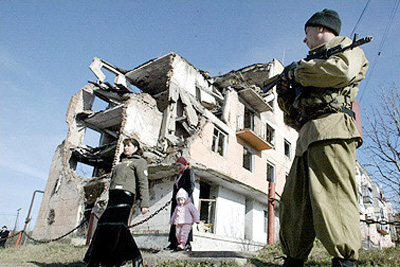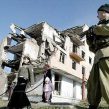
PARLIAMENTARY ELECTIONS IN CHECHNYA: NO CLEAR WINNER
Publication: Eurasia Daily Monitor Volume: 2 Issue: 224
By:

At noon on November 27, Russian TV broadcast a report about the progress of that day’s parliamentary elections in Chechnya. The correspondent was standing alone inside the heavily guarded government headquarters in Grozny. No other people were visible in the area and the scene was quiet except for a working generator. But if it was so calm in the most-secure location in the Chechen capital, then how silent must it have been out in the streets of the city? The same program also showed empty election precincts in Grozny; apparently the Chechens were in no hurry to take part in their first parliamentary elections since 1997.
Thus even a censored Russian TV channel, an official propaganda outlet, made plain the failure of the Kremlin’s Chechen project. Most of the Chechens simply refused to vote.
According to Kavkazsky Uzel correspondents, very few people went to the polls in Grozny. Only 45 votes had been cast by 11:00 am in election district no. 361 and only 75 voters had gone to the polls in district no. 369 by noon. By 2:15 p.m. only 146 voters had visited district no. 380 (Kavkazsky uzel, November 27).
These districts are located in the most populated areas of the Chechen capital, and the real numbers show a turnout of less than 10% of registered voters. Even fewer people voted in the city in the afternoon, when Chechens usually are hurrying home before dark. Vremya novostei ironically described Grozny as “calm and silent as usually happens on voting days” (Vremya novostei, November 28).
The Russian authorities had been worried about the turnout and made a variety of promises to lure voters to the polls. Alu Alkhanov, the pro-Russian leader of Chechnya, promised the withdrawal of Russian troops after the elections, while other announcements said that people would be compensated for houses destroyed during the war, and public transport in Grozny would be free for pensioners and veterans of war. It was even promised that Chechens sentenced to various prison terms outside Chechnya would be moved to local prisons, making visitation easier (regnum, November 17).
However, none of these tricks worked. The Chechens had no interest in the parliamentary vote. At a government meeting on November 15, Sergei Abramov, prime minister of the Chechen government, had to admit to the likelihood of a “low turnout at polling stations” and ordered district governors to use their resources to conduct elections more effectively. “Our future in a united legal space of Russia depends on the vote at the parliamentary elections,” Abramov concluded (regnum, November 17).
On November 21, Yevgeny Lazebin, the commander of the United Group of Federal Forces in Chechnya, warned that the militants would try to disrupt the elections by terrifying people and blackmailing officials (Interfax, November 21).
Such gloomy forecasts enraged people in the Kremlin who wanted to demonstrate that the Chechen elections were not a fake. An unofficial delegation of European politicians from the Parliamentary Assembly of the Council of Europe (PACE) planned to be in Chechnya on November 27 to observe the vote. Abramov, personally responsible for the success of the election project, was frantically shuttling between Moscow and Grozny until he was injured in a traffic accident rushing to the airport to fly back to Chechnya after a meeting in the Kremlin.
After Abramov was injured, Dmitry Kozak, the Russian presidential envoy to the Southern Federal District, went to Grozny to supervise preparations for the elections, but nothing could get ordinary Chechens interested in the voting.
Many young Russians from the pro-Russian President Vladimir Putin’s Nashi movement who had been sent to Chechnya to monitor the elections were shocked at seeing almost empty polling stations. “I don’t know what to say. I will report it to our leadership,” one of them noted (Newsru.com, November 28).
The PACE emissaries also concluded that the elections were a shame even though the Russian authorities did not let them see much. “The elections were not free,” Andreas Gross, the head of the Assembly mission, said in a November 30 interview with Nezavisimaya gazeta. The Europeans noted a rapid increase in the number of votes recorded in some election districts in the afternoon (Kavkazsky Uzel, November 28). Such afternoon inflation usually happens when officials throw empty ballots into poll boxes to make it look as though more voters participated and to falsify the results.
The poor turnout has encouraged the Chechen rebels. “As with all of Moscow’s previous attempts to force its will on the Chechen people on fear of death, this farce completely failed,” according to a statement issued by the separatist government’s press agency (Kavkaz-center, November 28). Few Chechens considered the elections to be legitimate or relevant. In a rally in Grozny just six days before the vote, people who were protesting the murder of three Chechen civilians by Russian soldiers declared, “If the Russians do not care about us, we will not care about their elections” (Kommersant, November 22).
The Kremlin can still score a propaganda victory. Almost simultaneously the leadership of the European Union and the U.S. State Department issued official statements calling the elections “an important step towards a wider representation of different opinions within Chechen society.” In reality, however, the elections have demonstrated quite the opposite; namely, Chechens are united by their hatred for Russia. The election boycott shows that, despite much suffering and many losses, Chechen society does not recognize the legitimacy of the local pro-Russian government and is still keen to continue to press for Chechen independence.




